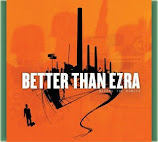
Insert your best "What the fuck" right here I suppose, but, yes, I will now defend a Better Than Ezra album.
It's funny that I decided a few days ago to revisit this album for this column. When I was giving a preview to the best friend yesterday, I thought I couldn't of timed this post better. This week is 10 years exactly since the album was released. Sometimes, I have a good thing with timing and sometimes I don't. I'm happy this one worked out at least.
1998 was an interesting time for alternative rock. In the year prior, The Chemical Brothers came out of nowhere with Dig Your Own Hole and the smash singles "Setting Sun" and "Block Rockin' Beats". The question on the mind of every prominent musician and music fan was that of "Is this it? Is electronica the next big movement?" This paved the way for bands to rethink their rock and roll approach: The Smashing Pumpkins did it in June of 1998 with their dark opus, Adore, and in 1999 Blur would trade in their "Woo-ooh's!" for melancholy, malaise and keyboards and drum loops on 13. And in between these two releases, in August of 1998, Better Than Ezra emerged with a collection that no one could've seen coming. An album that was a critical landmark and a commercial flop, a fish out of water, gasping for its last moments of air.
It was in 1998 that a Sunday night tune-in to Modern Rock Live, the syndicated new music show where Max Tolkoff interviewed bands with new album's who would sometimes play in the studio, would bring us to where we are now, to this tale. Max talked with the trio from N'awlins and it was the song "One More Murder" that just blew me away. I had my worn out copy of Deluxe, thanks to the alterna-hit "Good", and I also enjoyed the track "Rosalita", but nothing had moved me in their catalog like this song did. It's dark piano started it off: it sounded like it was going to be a trip-hop number until the drums kicked in. And there was no guitar, it was all keyboards, samples, programmed elements. Kevin Griffin sang of chalk line profiles, times spent in the slammer, all while speaking it in a gruff deep in the right channel of the mix.
There was no "Good" on this album; no "Desperately Wanting" to be found among the 14 tracks on an album subtitled A Series of Nocturnes. There would be songs that would hark back to their earlier rock-infused roots like "Pull", but you wouldn't know from the opening moments of the album. The first song, "Je Ne M'en Souviens Pas" let the listener know they were not getting a sequel to their first two albums. Starting off with drum loops, keys and samples would enter the fold before treated vocals would deliver a muffled line. Eventually, Griffin would start to ramble low in the mix, like any other man in BTE's beloved home of New Orleans. He kept talking while he started singing while that inital first line came back in. I'm sure most people turned this off right away, being confused by what in the hell was going on, but I was just floored.
And while at most times experimenting with the trip-hop and the electronica that was being dubbed the music of our futures, they did know how to step back for a minute and try to fuse both past and present for a future sound. The very minor hit "At The Stars" was a solid radio hit, as if they had to go back at the 11th hour and add that one in, but everything else found ways to incorporate what they were and what they wanted to be. The best examples would be that of the epic "Particle", with it's drum loop intro and programmed elements throughout that fought for their time in the six-minutes of the song with strings and guitars.
What brings it all together is the closing pair of tracks. There's the mini-suite "New Kind Of Low" - "a) Low" was 80 seconds of just loud rock guitars, fuzzy sludge bass and barked out lyrics, which then is met with samples firing off, signalling the transition in to "b) Coma". This part was a rollicking slow blues jam without BB King's guitar, just wurlitzers, keyboards and introspective lyrics. It showcased a fully realized idea of what this three men were trying to accomplish, throwing their names in to the rocktronica hat. And you think the album would there, but instead it goes in to "Waxing Or Waning?" It was a three-minute afterthought, a jazzy epilogue with 12-string guitars, muted horns and a near-waltz created by the bass drum and hi hat. I'm convinced there's no snare in the mix at all.
Die hard fans of this band easily cite this the best album in the band's catalog, and it's pretty obvious why. It's also an album that completes the trifecta of albums released in 1998 on Elektra by bands that got dropped soon thereafter (the other albums? Nada Surf's The Proximity Effect and Superdrag's Head Trip in Every Key. Duh.) Serene and experimental, it makes you wish they would've made another album like this, but they didn't. Like all great bands who experiment, they eventually denounce what they were trying to do as an artistic statement and go back to their old ways. Sometimes, maybe they should just stay true to what they wanted to be as opposed to going back to play the same dog and pony show that is comfortable.
CEO Jimmy Jam Records
Big Media Excitement




